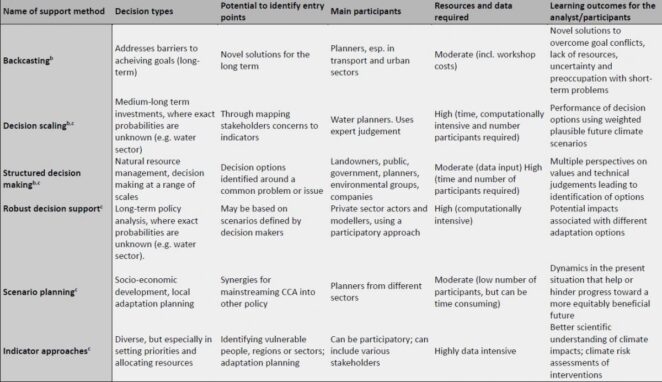Article /
Research Methods for Understanding and Supporting Decision Processes in African Cities

Introduction
This Working Paper reviews 12 decision-making methods to explore how different approaches may lead key people working in cities and surrounding urban areas of Southern Africa to make better-informed decisions about adapting to climate change.
The review covers both decision-making process methods – that is, those that describe and provide insights about empirical cases of decision-making- and decision-making support methods – those that analyse normative dimensions of how a decision could be made.
The review provides information for Future Resilience for African CiTies and Land (FRACTAL), which aims to address the challenge of providing policy-makers in the region with accessible, timely, applicable and defensible climate information. FRACTAL is designed to work across disciplines within the both natural and social scientific communities, and to foster strong collaboration between researchers, city government officials, ministers and other key decision makers in southern Africa. Read more about the FRACTAL principles of transdisciplinarity, co-production and co-exploration here.
Decision-making process methods reviewed
The review covers both decision-making process methods and decision-making support methods that are multidisciplinary in scope.
- In this typology, process methods aim to analyse empirical cases of decisions that have been made or are being made (either retrospectively or in real-time) in order to describe and better understand how decisions were arrived at.
- By contrast, support methods aim to provide analyses of how a decision between various options could be made (i.e., prospectively): these are methods that typically use rigorous and tested, formal approaches.
Process methods
- Theories of Collective Action
- Foresight
- Multiple Streams Framework
- Processual Analysis
- Applied behaviour analysis and organizational behaviour management
- Adaptation pathways approach

Support methods
- Robust Decision Support
- Structured Decision Making
- Decision Scaling
- Backcasting
- Scenario planning
- Indicator approaches

Themes characterising the nature of contemporary decision-making
The review presents key conceptual and theoretical insights drawn from multiple disciplines. The analysis frames the broader discussion in the context of both the use of relevant knowledge, and the prevailing policy-science interface in decision making. The report argues that three themes increasingly characterise the nature of contemporary decision-making:
- the increasing complexity of problems – the rise of so-called “wicked” problems.
- the necessary shift away from linear models of decision-making.
- the rise of “risk” as a central concept for dealing with uncertainty.
Key points
Many of the 12 reviewed methods link closely to one or more of these themes. The analysis here offers observations, and raises questions for further investigation. Key points include:
- Although the included methods have been applied to a very wide range of decision types, it is notable that many have not been used in urban contexts or only in limited cases.
- Many of the methods reviewed are participatory and iterative in nature, and therefore, psycho-social constraints may affect the accuracy, reliability, and credibility of information used in decision-making processes.
- Many methods are time- and resource-intensive. Analyses that require considerable investments of financial resources, technological capacity and human capital, should be used only where necessary, to ensure better-targeted decision support.
- The learning outcomes from the methods reviewed are diverse, and would require further investigation were they to be used as a basis upon which to select a decision method.
- The use of multiple methods is a possible approach, although this should be balanced with the potentially increased costs (e.g., for data collection), especially if stakeholders are involved, and the additional burden falls on them.
In addition, the working paper considers how these decision-making methods can contribute to the expanding field of climate services. Interestingly, the authors find a lack of medium- to long-term climate services applicable to the urban African context: thus, this is an important gap that FRACTAL can fill.
- The paper provides examples of possible decision-making methods that might address existing FRACTAL research questions.
- The findings offer concrete next steps for FRACTAL as it moves forward.
This working paper was written by Richard Taylor, Ruth Butterfield, Sukaina Bharwani, Anna Taylor, Tahia Devisscher, from the Stockholm Environment Institute Oxford Centre.
Suggested citation
Taylor, R., Butterfield, R.E., Bharwani, S., Taylor, A., and Devisscher., T (2017) Research Methods for Understanding and Supporting Decision Processes in African Cities. FRACTAL Working Paper 5. Stockholm Environment Institute Oxford Centre, Oxford, UK
Related Articles
- FRACTAL project website
- FRACTAL: Future Resilience for African Cities and Lands
- Co-producing climate knowledge – Great in theory, but how about practice?
- Africa's Climate: Helping decision-makers make sense of climate information
- What is Transformative Scenario Planning?
- Webinar: Adaptation Pathways – From Concept to Practice
- The Robust Decision Support process for participatory planning
- MEDIATION - Methodology for Effective Decision-making on Impacts and Adaptation:context, methods and metrics
- Transdisciplinarity, co-production, and co-exploration: integrating knowledge across science, policy and practice in FRACTAL
- Bottom-Up Adaptive Decision-Support for Resilient Urban Water Security: Lusaka Case Study
